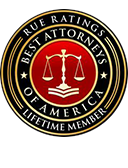

Failure to Stop after a Traffic Accident
If you failed to stop and then left the scene of a traffic accident without providing all of the information required under Ohio law, then a criminal investigation has begun. Local law enforcement agencies have officers and detectives devoted to investigating these types of criminal offenses.
If witnesses can identify the vehicle involved in the crash, then the investigating officer’s next step will be to travel to the owner’s home or place of business to interrogate that person about the crash. Any statement you make can be used against you during a criminal investigation.
Failing to stop after a traffic crash is a serious offense that comes with criminal penalties that can last a lifetime. Never leave the scene after a crash, but if you did, don’t compound the problem by talking to a law enforcement officer. You have the right after a criminal investigation begins to retain an attorney to help you will the criminal investigation.
Your attorney can contact the officer investigating the hit and run, contact your insurance company, and help you will all of the issues that come up after an allegation of leaving the scene of a crash. Call an attorney at Joslyn Law Firm today for a free and confidential consultation. Call (513) 399-6289.
Attorney for Failure to Stop Crimes in Cincinnati, Ohio
Leaving the scene of a motor vehicle crash in a “Hit and Run” is a crime under Ohio Revised Code for failing to stop after an accident on public roads of highways in violation of ORC 4549.02. Other forms of hit and run include:
- R.C. 4549.03 – Stopping after an accident involving damage to realty or personal property attached to real property
- R.C. 4549.021 – Stopping after an accident on other than public roads or highways
If you were charged with leaving the scene and failing to stop after a traffic crash or accident, then contact an experienced criminal defense attorney at Joslyn Law Firm in Cincinnati, OH. Our attorneys represent clients under investigation for hit and run after a crash with property damage, a parked vehicle, or an occupied vehicle.
A violation of Ohio’s hit and run statute is charged as a misdemeanor of the first degree, but the offense becomes a felony if anyone is seriously injured in the crash. If you are convicted of this offense, the court is required to impose a class five suspension on your driver’s license.
Call (513) 399-6289 to discuss your case.
Penalties for Hit and Run Crimes in Ohio
The penalties for leaving the scene of a crash during a hit and run depend on several factors including whether a person was hurt or only property damage occurred including:
- A first degree misdemeanor for failing to stop is punishable by 6 months in jail and up to $1,000 in fines;
- If the accident results in serious harm to another person then the crime can be charged as a fifth degree felony punishable by at 6 months in jail and up to $2,500 in fines;
- If the hit and run crash resulted in the death of another person, then the crime can be charged as a third degree felony with at least 9 months in prison and up to $10,000 in fines.
If you failed to stop after an accident in Ohio will also receive a class five suspension of the driver’s license which can last for a minimum of 6 months and up to a maximum of three years. Additionally, if you are convicted of a hit and run offense, you can also be assessed 6 points on your driver’s license.
We can help 24/7.
Elements of Failure to Stop after an Accident in Violation of R.C. 4549.02
The elements of the crime of failure to stop after an accident in violation of R.C. 4549.02 that must be proven at trial beyond all reasonable doubt include the following:
- the defendant drove or operated a motor vehicle on a public road or highway;
- the defendant was involved in an accident or a collision with a person or property;
- the defendant had knowledge of the accident or collision;
- failed to immediately stop his/her motor vehicle at the scene of the accident or collision; and
- the defendant failed to:
- (E)(1) remain at the scene of the accident or collision until:
- he/she gave his/her name and address and if the defendant is not the owner, the name and address of the owner of the motor vehicle and the registered number of the motor vehicle;
- to any person injured in the accident or collision;
- to the operator, occupant, owner or attendant of motor vehicle damaged in the accident or collision
- to any police officer at the scene of the accident or collision; or
- (E)(2) if the person with whom the defendant was involved in the accident or collision was injured and unable to comprehend or understand and record the defendant’s name and address and if the defendant is not the owner, the name and address of the owner of the motor vehicle and the registered number of the defendant’s motor vehicle, the defendant failed to notify forthwith and immediately the nearest police authority concerning the location of the accident or collision and defendant’s name and address and the registered number of the vehicle that the defendant was operating and remain at the scene of the accident or collision until a police officer arrived unless removed from the scene by an emergency vehicle operated by a political subdivision or an ambulance; or
- (E)(3) if the accident or collision was with an unoccupied or unattended) motor vehicle, the defendant failed to securely attach in writing his/her name and address and if the defendant is not the owner, the name and address of the owner of the motor vehicle and the registered number of the motor vehicle to a conspicuous place in or on the unoccupied or unattended motor vehicle.
- (E)(1) remain at the scene of the accident or collision until:
The duty to stop and provide information applies to any accident or collision involving a motor vehicle, regardless of who caused the accident or collision. It is not necessarily a defense that the defendant was not the person at fault in the accident or collision.
Definitions in Ohio’s Failure to Stop Statute
Under Ohio’s statutory scheme for failing to stop or leaving the scene of an accident, the following definitions apply:
- “Drive” means to cause or have caused movement of a motor vehicle or being in control of a motor vehicle while it is in motion;
- “Operate” includes not only a person being in control of a vehicle while it is in motion but also a person, whether conscious or unconscious, in the driver’s location in the front seat of a stationary vehicle so as to be capable of doing any act or series of acts that could cause or contribute to the vehicle being put in motion. It is not necessary to prove that the defendant ever had the vehicle in motion or intended to put the vehicle in motion;
- “Public road or highway” includes all public thoroughfares, bridges, and culverts;
- “Accident” means any situation when a driver operates his/her motor vehicle and causes damage or injury to the property of another or another person;
- “Collision” means the striking together of two objects, one of which may be stationary, that causes damage or injury to the property of another or another person. The term “collision” implies an impact or sudden contact of a moving body with an obstruction in its line of motion, regardless of whether both bodies are in motion or one is in motion and the other is stationary;
- “Results” means something that arises as a direct or indirect consequence.“Results” of (an accident) (a collision) is not the same as “caused.”
Knowledge of a Hit and Run Crash in Ohio
The duty to stop and provide information applies only when there is knowledge of damage, not when there has been a coming together of two motor vehicles and neither party knows of any damage having been inflicted. The subjective opinion of the defendant is not necessarily determinative of the issue.
Under Ohio’s hit and run statute, the prosecutor must prove knowledge of the crash. A person has knowledge of circumstances when he/she is aware that such circumstances probably exist. Since it is not possible to look into the mind of another, knowledge is determined from all the facts and circumstances in evidence.
From these facts and circumstances, the finder of fact can sometimes determine whether there existed at the time in the mind of the defendant an awareness of the probability that an accident or a collision occurred that resulted in injury or damage.
Serious Physical Harm or Death in a Felony Hit and Run
If your verdict is guilty you will separately decide whether the accident or collision resulted in serious physical harm or death to a person. The issue is not whether the defendant caused serious physical harm or death to a person, but whether the accident or collision resulted in serious physical harm or death to the person, regardless of fault.
If the accident or collision results in serious physical harm to a person, failure to stop after an accident is whichever of the following is applicable:
- HIt and run involving serious bodily injury is usually charged as a felony of the fifth degree;
- If the offender knew that the accident or collision resulted in serious physical harm to a person, then the crime is charged as a felony of the fourth degree;
- If the accident or collision results in the death of a person, failure to stop after an accident is a felony in the third degree unless the driver knows that the accident resulted in death and then the crime is charged as a felony of the second degree.
Reasons Why a Driver Leaves the Scene of an Accident
The most common reasons why a driver fails to stop and leaves the scene of a traffic crash is because the driver is worried about one of the following:
- driving under the influence of alcohol or a controlled substance;
- being in possession of contraband such as drugs or a firearm;
- driving with a suspended driver’s license;
- driving without insurance;
- having an outstanding warrant for a new criminal offense, failure to appear in court or a violation of probation; or
- not having insurance.
Additional Resources
4549.02 Stopping after an accident on public roads or highways – Visit the website of the LAW Writer® Ohio Laws and Rules to search the Ohio Revised Code in Title 45 for motor vehicle crimes including stopping after an accident on public roads or highways in violation of R.C. 4549.02
Cincinnati Attorney for Hit and Run Crimes in Ohio
After a hit-and-run investigation begins, you should seek out the services of an experienced criminal defense attorney in Cincinnati, Ohio.
We understand the tactics of local law enforcement agencies when they start the investigation. We can contact those officers to keep them from coming to your home or office to interrogate you. We can help you assert your right to remain silent and your right to have an attorney represent you at every stage of the investigation.
Call today for a free and confidential consultation. Call (513) 399-6289 today.
Have you been charged with reckless operation? Contact a reckless driving lawyer near you.























